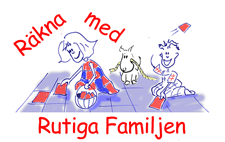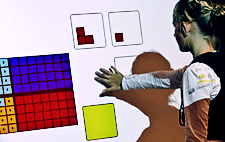 En ny artikel ”A Teachable Agent Game Engaging Primary School Children to Learn Arithmetic Concepts and Reasoning” har publicerats i en internationell tidskrift om intelligenta spel och andra digitala verktyg i skolmiljö: International Journal of Artificial Intelligence in Education av Springer
En ny artikel ”A Teachable Agent Game Engaging Primary School Children to Learn Arithmetic Concepts and Reasoning” har publicerats i en internationell tidskrift om intelligenta spel och andra digitala verktyg i skolmiljö: International Journal of Artificial Intelligence in Education av Springer
(eftersom artikeln publiceras internationellt, är den på engelska).
Abstrakt: In this paper we will describe a learning environment designed to foster conceptual understanding and reasoning in mathematics among younger school children. The learning environment consists of 48 2-player game variants based on a graphical model of arithmetic where the mathematical content is intrinsically interwoven with the game idea. The environment also features teachable agents, which are computer programs that can be taught and behave according to their knowledge. Thus, the environment provides both learning-by-doing (playing the game) and learning-by-teaching (teaching the agent to play). It differs from other learning-by-teaching systems 1) by targeting basic mathematics and primary grade students; 2) by using teachable agents as an extension to educational games in order to leverage engagement, reflection and learning; and 3) by using an agent-driven question dialogue to challenge students’ mathematical thinking, to role-model learner behaviour and to transfer game knowledge to out-of-game mathematics. The teachable agent game is described and evaluated in an authentic classroom study enrolling 443 students from 22 classes in 9 schools. Students range from 2nd to 6th grade of mainstream classes and 7th to 8th grade for students with difficulties in mathematics. Part of the study was designed as a quasi-experimental study with controls; part was designed to examine students’ change in mental models of arithmetic before and after game play. All students took pre- and post mathematics tests. The 314 playing students used the game and taught their agents during regular math-classes for three months, whereas the control classes attended standard instruction and took the tests. A questionnaire was distributed in the end of the study to investigate students’ perceptions and performances of the agent-tutoring task. Results show that 1) there is a significant learning gain for playing student compared to controls, 2) the learning environment can engage children in advanced mathematical thinking in early education, 3) that young primary students can act as successful tutors. Thus, we conclude that teachable agents is a candidate for leveraging learning in educational games to deeper levels that transfer outside the game. This idea combines the motivational power of games with the reflective power of a teachable agent asking though-provoking, deep questions on the learning material during game play.
Pareto, L. (2014). A Teachable Agent Game Engaging Primary School Children to Learn Arithmetic Concepts and Reasoning. In International Journal of Artificial Intelligence in Education, Volume 24, Issue 3, pp 251-283. Springer New York.




